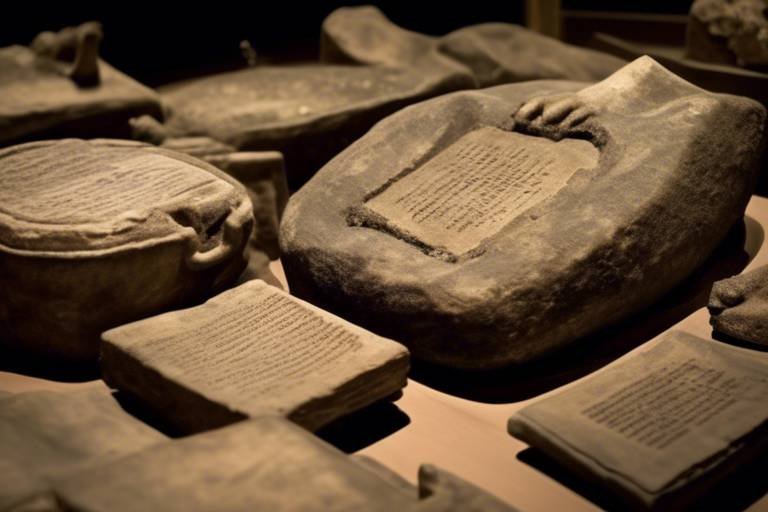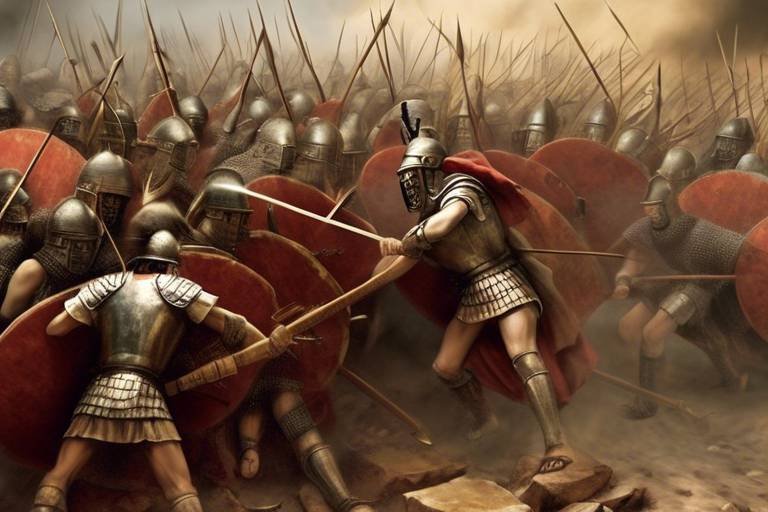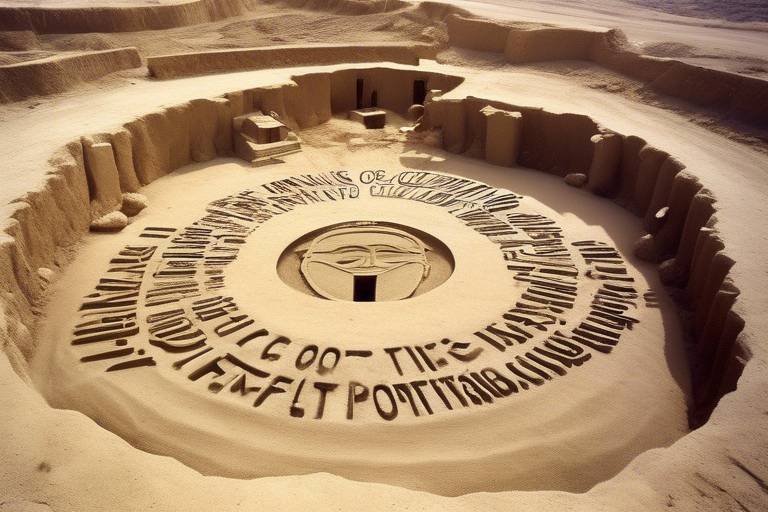The Role of Archaeology in Post-Conflict Societies
Archaeology plays a crucial role in post-conflict societies by preserving cultural heritage, fostering reconciliation, promoting understanding of the past, aiding in rebuilding communities, providing evidence for justice, and contributing to economic development and tourism.
Archaeology helps preserve the cultural heritage of post-conflict societies, safeguarding their identity and history from destruction or distortion during times of turmoil.
Through uncovering and interpreting historical artifacts and sites, archaeology can facilitate reconciliation processes by fostering dialogue, understanding, and healing among communities affected by conflict.
Archaeological findings provide valuable insights into the past, helping societies understand the root causes of conflicts, patterns of human behavior, and societal dynamics that led to violence.
Archaeological projects in post-conflict societies can contribute to rebuilding communities by creating employment opportunities, fostering a sense of pride and ownership, and revitalizing local economies.
Archaeological evidence, such as mass graves or artifacts, can be crucial in documenting human rights violations, war crimes, and atrocities, providing evidence for truth and justice processes.
Archaeological sites and heritage tourism can be significant sources of revenue for post-conflict societies, contributing to economic development, job creation, and sustainable growth.
Archaeological research and findings can be used to educate the public, raise awareness about historical injustices, and promote a culture of peace and tolerance in post-conflict societies.
Archaeological data and expertise can inform policy-making and urban planning in post-conflict societies, ensuring that historical sites are protected, and cultural heritage is integrated into development strategies.

Preservation of Cultural Heritage
Preservation of cultural heritage through archaeology in post-conflict societies is akin to safeguarding a time capsule filled with the essence of a community's identity and history. Imagine a delicate tapestry woven with threads of tradition, stories, and customs, threatened by the ravages of conflict. Archaeologists step in as the custodians of this tapestry, meticulously unraveling its intricate patterns from the debris of war, ensuring that the threads of the past are not lost to the winds of time.
By excavating ancient sites, uncovering artifacts, and piecing together fragments of the past, archaeologists act as storytellers, narrating the tales of civilizations long gone. These narratives serve as a bridge between the tumultuous present and the serene past, offering a glimpse into the rich tapestry of cultures that once thrived in the region.
Moreover, the preservation of cultural heritage through archaeology is not merely a passive act of conservation; it is a dynamic process that breathes life into the relics of the past. As artifacts are unearthed and sites restored, a sense of continuity is forged, connecting present generations to their ancestors and fostering a deep-rooted sense of belonging and pride.
Through the preservation of cultural heritage, post-conflict societies can reclaim their narrative, reclaim their identity, and reclaim their future. It is a testament to resilience, a tribute to the enduring spirit of humanity, and a beacon of hope shining brightly amidst the shadows of the past.

Reconciliation and Healing
Reconciliation and healing are vital aspects of post-conflict societies, and archaeology plays a significant role in fostering these processes. By uncovering historical artifacts and sites, archaeologists provide tangible evidence of a shared past, allowing communities to confront their history and work towards reconciliation. The act of excavating and interpreting these artifacts can serve as a catalyst for dialogue and understanding among groups that have been divided by conflict.
Moreover, archaeology helps in healing the wounds of the past by offering a platform for communities to come together, acknowledge past traumas, and collectively envision a peaceful future. Through collaborative efforts in archaeological research and preservation, individuals can find common ground and build bridges towards forgiveness and healing.
Imagine a broken vase being meticulously pieced back together, each fragment representing a different aspect of a community's history. Archaeology acts as the glue that binds these fragments, allowing for a comprehensive understanding of the past and paving the way for reconciliation and healing.
Furthermore, archaeological projects often involve local communities in the excavation and preservation process, empowering them to take ownership of their heritage and participate in the healing journey. This hands-on involvement not only fosters a sense of pride and unity but also instills a collective responsibility towards preserving cultural heritage for future generations.

Understanding the Past
Archaeology plays a crucial role in post-conflict societies by preserving cultural heritage, fostering reconciliation, promoting understanding of the past, aiding in rebuilding communities, providing evidence for justice, and contributing to economic development and tourism.
Delving into the past through archaeological findings is like peering through a window into history. It allows us to uncover the layers of time, revealing the stories of our ancestors and the events that shaped our present reality. By studying artifacts and excavating ancient sites, archaeologists provide us with a roadmap to understand the complexities of human civilization. It's akin to solving a puzzle where each piece unearthed adds to the bigger picture, helping us comprehend the root causes of conflicts, the evolution of societies, and the lessons we can learn from our shared history.

Community Rebuilding
Community rebuilding in post-conflict societies is a multifaceted process that goes beyond physical reconstruction. Archaeological projects play a vital role in this endeavor by fostering a sense of belonging, pride, and resilience among the affected communities. By uncovering and preserving historical sites, archaeologists not only create job opportunities but also revive local economies through heritage tourism.
Moreover, community engagement in archaeological initiatives can instill a sense of ownership and responsibility, empowering individuals to take an active role in shaping their collective future. Through educational programs and public outreach, archaeologists can raise awareness about the shared heritage of diverse communities, promoting unity and understanding.
Archaeological findings also serve as a reminder of the resilience of past civilizations, inspiring hope and determination in rebuilding efforts. By integrating cultural heritage into community development plans, post-conflict societies can create sustainable strategies that honor the past while building a prosperous future.

Evidence for Justice
Archaeology plays a critical role in post-conflict societies by providing . The excavation of archaeological sites can uncover mass graves, artifacts, and other material remains that serve as crucial evidence in documenting human rights violations, war crimes, and atrocities committed during times of conflict. This evidence not only helps in bringing perpetrators to justice but also contributes to truth and reconciliation processes by shedding light on past injustices and atrocities.

Economic Development and Tourism
Archaeology plays a significant role in the economic development and tourism of post-conflict societies. By uncovering and preserving historical sites and artifacts, archaeology attracts tourists, researchers, and investors, contributing to the growth of local economies. These archaeological sites not only serve as cultural attractions but also as sources of revenue and employment opportunities for the community.
Furthermore, heritage tourism driven by archaeological discoveries can stimulate sustainable economic development in post-conflict regions. Visitors are drawn to these sites to learn about the history and culture of the area, generating income through entrance fees, guided tours, souvenir sales, and hospitality services. This influx of tourism can create a ripple effect, benefiting various sectors of the economy and supporting long-term growth.

Education and Awareness
Education and awareness are vital components of post-conflict societies' journey towards healing and reconciliation. By utilizing archaeological research and findings, these societies can educate their citizens about the historical injustices that occurred, fostering a culture of remembrance and understanding. Through educational initiatives, such as museum exhibitions, school programs, and public lectures, archaeology can bring the past to life and engage the community in meaningful dialogues about the impact of conflict on their society.
Furthermore, archaeology plays a crucial role in raising awareness about the importance of preserving cultural heritage and protecting historical sites. By showcasing the significance of these sites in shaping collective identity and promoting a sense of belonging, archaeologists can instill a sense of pride and respect for the past among the population. This awareness not only contributes to the preservation of cultural heritage but also fosters a culture of peace and tolerance, essential for the long-term stability of post-conflict societies.

Policy and Planning
Policy and planning in post-conflict societies are crucial aspects that can benefit significantly from the insights provided by archaeology. By utilizing archaeological data and expertise, policymakers and urban planners can make informed decisions that prioritize the protection of historical sites and the integration of cultural heritage into development strategies. This ensures that the rich history of these societies is not only preserved but also utilized as a foundation for sustainable growth and community development.
Frequently Asked Questions
- Why is archaeology important in post-conflict societies?
Archaeology plays a crucial role in post-conflict societies by preserving cultural heritage, fostering reconciliation, promoting understanding of the past, aiding in rebuilding communities, providing evidence for justice, and contributing to economic development and tourism.
- How does archaeology contribute to reconciliation and healing?
Through uncovering and interpreting historical artifacts and sites, archaeology can facilitate reconciliation processes by fostering dialogue, understanding, and healing among communities affected by conflict.
- What role does archaeology play in community rebuilding?
Archaeological projects in post-conflict societies can contribute to rebuilding communities by creating employment opportunities, fostering a sense of pride and ownership, and revitalizing local economies.
- Can archaeology provide evidence for justice in post-conflict societies?
Archaeological evidence, such as mass graves or artifacts, can be crucial in documenting human rights violations, war crimes, and atrocities, providing evidence for truth and justice processes.
- How does archaeology impact economic development and tourism in post-conflict societies?
Archaeological sites and heritage tourism can be significant sources of revenue for post-conflict societies, contributing to economic development, job creation, and sustainable growth.



















